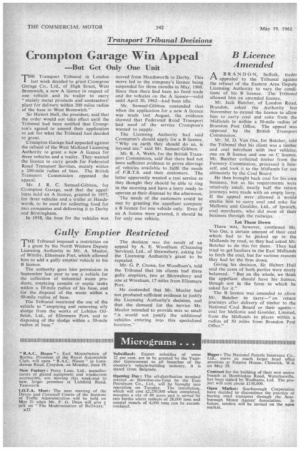Transport Tribunal Decisions
Page 38

If you've noticed an error in this article please click here to report it so we can fix it.
Crompton Garage Win Appeal
—But Get Only One Unit
THE Transport Tribunal in London 1 last week decided to grant Crompton Garage Co., Ltd., of High Street, West Bromwich, a new A licence in respect of one vehicle and its trailer to carry "mainly metal products and contractors' plant for delivery within 200 miles radius of the base in West Bromwich."
Sir Hubert Hull, the president, said that the order would not take effect until the Tribunal had been notified that Crompton's agreed to amend their application to ask for what the Tribunal had decided to grant.
Crompton Garage had appealed against the refusal of the West Midland Licensing Authority to grant a new A licence for three vehicles and a trailer. They wanted the licence to carry goods for Federated Road Transport Services, mainly within a 200-mile radius of base. The British Transport Commission opposed the appeal.
Mr. J. R. C. Samuel-Gibbon, for Crompton Garage, said that the appellants held an A licence, granted in 1957, for three vehicles and a trailer at Handsworth, to be used for collecting food for two companies and delivering it to Derby and Birmingham.
In 1958, the base for the vehicles was
moved from Handsworth to Derby. This move led to the company's licence being suspended for three months in May, 1960. Since then there had been no food trade and the vehicles on the A licence—valid until April 30, 1962—had been idle.
Mr. Samuel-Gibbon contended that when the application for a new A licence was made last August, the evidence showed that Federated Road Transport had need of the service Crompton's wanted to supply.
The Licensing Authority had said Crompton's should apply for a B licence. "Why on earth they should do so, is beyond me," said Mr. Samuel-Gibbon.
Mr. R. A. Webb, for the British Transport Commission, said that there had not been sufficient evidence to prove shortage of vehicles available to fulfil the needs of F.R.T.S. and their customers. The latter apparently wanted a taxi service as they thought they should be able to ring in the morning and have a lorry ready to operate at their disposal by the afternoon.
The needs of the customers could be met by granting the appellant company a B licence for one vehicle only. Even if an A licence were granted, it should be for only one vehicle.




























































































































